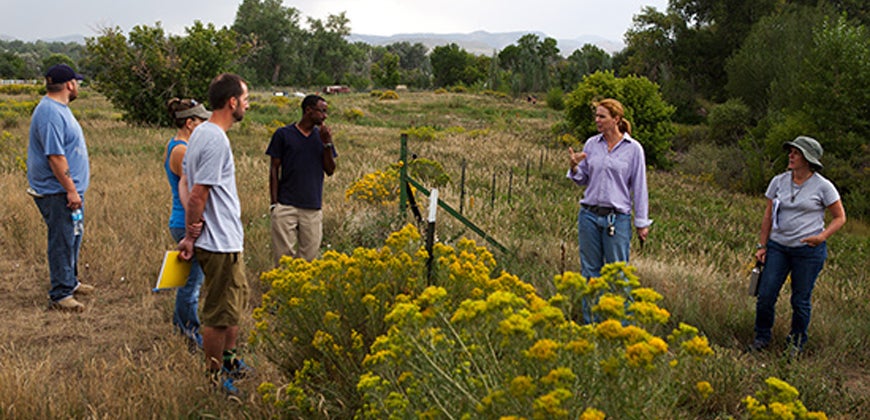CU Denver: Farms in the city

Although Five Fridges Farm is just outside Denver city limits, its 13 acres have the livestock smells and by-products of a traditional farm out in the countryside—and CU Denver students are experiencing it all, as they work to earn a newly available certificate in Food Systems and Sustainable Urban Agriculture from the Department of Geography and Environmental Sciences. Approved by the College of Liberal Arts and Sciences in March 2012 and offered to students the following fall semester, the four-class certification program integrates traditional classroom instruction with hands-on field research at Five Fridges.
“I want to get students to participate with food systems and to see the different ways that urban agriculture can look,” said Weaver, PhD, a geography scholar who lives in the renovated farmhouse on the land at Five Fridges, which is practically next-door to apartments and condos. On the farm, Weaver raises milk goats, food crops and, now, CU Denver geography students.
A Different Beast Entirely
Since purchasing the Wheat Ridge property from its long-time owner in 2012, Weaver has secured a conservation easement and land trust deed, which prevent the land from being subdivided or used for any purpose other than agriculture.
“Urban agriculture is really a different beast,” Weaver said. “You get issues you just would never have on a traditional farm.”
She must navigate labyrinthine land management rules, which include both rural issues—agricultural ditch water, invasive weeds, grazing, fencing, etc.—and issues of urban infrastructure—storm water, sewage, utilities, zoning restrictions, trespassing and more.
“What keeps me going is that I am not bored with it,” geography major Caitlin Reusch said of the coursework on the farm. “There is always a new question.”
For instance, how do you keep a group of teenagers from the neighboring high school from throwing their cigarette butts into the livestock enclosures? Weaver has worked closely with Brian Page, PhD, associate professor and department chair, to develop a curriculum for the certificate that prepares students to find answers to questions like this one.
“[The certificate] stamps students as having a valuable skill set,” Page said.
A Viable Profession
So, will this certificate in Food Systems and Sustainable Urban Agriculture turn students into farmers? Short answer: no.
“This is not a program where you’re going to learn how to grow prize-winning tomatoes,” Weaver said. “This is about how to make urban agriculture viable as a profession.”
Whether they want to work on a farm or in an office, students who understand urban agriculture have careers waiting for them, Weaver said. This is because the urban agriculture movement is quickly evolving, which means laws and regulations must evolve, too.
“I am seeing job descriptions all the time for beginning planners and people involved with the urban environment,” she said. “Cities are changing their land management rules very quickly, so they need people who understand these agricultural issues, and there are so few people with this expertise.”
Reusch isn’t worried.
“There are so many places one can go with urban agriculture, from being an urban farmer to researching the effects of urban farms on the land, economy and world food systems,” she said. “With all of the applications of urban agriculture, I am sure I will find something I love.”
A Farm Field Study
In the classroom, students discuss the economic viability of local agriculture. On the farm, they meet local growers and make connections between academic concepts and real systems.
“Five Fridges offers up so many opportunities for small-size environmental and microbiological studies,” Reusch said. “With the farm, you can see your research growing and thriving.”
In order to remain profitable, Five Fridges Farm not only produces, markets and sells its own products but also sells wares from a variety of local producers—from beekeepers to soap-makers to beer brewers. Students learn all of this and more first-hand through the certificate curriculum.
“Like any good curriculum, this one is evolving and adapting to the students who are in it,” Page said. He and Weaver expect students to play an integral role in shaping the future not only of Five Fridges Farm but of the urban agriculture movement.
“It's integrating more field study into a liberal arts degree,” Weaver said. “It’s truly applying their knowledge.”
Contact: stories@ucdenver.edu




